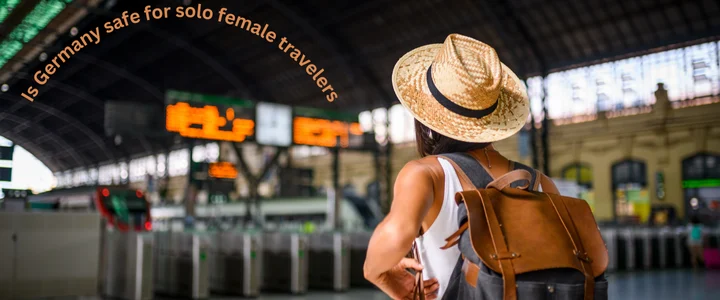Is Germany Safe To Travel Alone?
Traveling solo as a woman can be both exciting and a bit nerve-wracking, especially when venturing into new countries. I’ve been fortunate to explore many places on my own, including Belgium and Berlin, where I had wonderful experiences. But when I started planning my trip to Germany, the question that kept popping up was, “Is Germany safe for solo female travelers?” It’s a question I know many of us have, so I decided to share my experience to help you feel more confident about your journey.

Germany, with its rich history, vibrant cities, and beautiful landscapes, has so much to offer. But like any destination, it’s important to be aware of the local customs and safety tips to make the most of your trip. As I traveled through Berlin and beyond, I found Germany to be a safe and welcoming place for solo female travelers. The country’s efficient public transportation, friendly locals, and well-maintained public spaces made getting around easy and stress-free. In this article, I’ll dive into the details of my trip, covering everything from navigating public transport to making friends along the way, so you can plan your own adventure with peace of mind.
Table of Contents
Understanding Germany’s Safety Levels
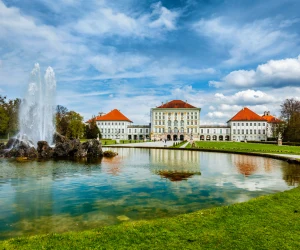
Germany consistently ranks as one of the safest countries in the world, making it a popular destination for travelers, including solo female adventurers. With a well-developed infrastructure, low crime rates, and a high standard of living, Germany provides a relatively safe environment for women traveling alone. However, like any destination, there are still risks that solo female travelers should be aware of and prepared for.
General Safety in Germany
Germany’s safety reputation is well-earned, as the country enjoys one of the lowest crime rates in Europe. Violent crime is relatively rare, and when it does occur, it is often concentrated in specific areas and situations that can generally be avoided with the right precautions.
- Crime Rates: According to recent statistics, Germany’s overall crime rate has been on a steady decline over the past decade. The most common crime that travelers might encounter is petty theft, particularly in crowded places like tourist hotspots, public transport, and festivals. Pickpocketing, bag snatching, and scams are the primary concerns, rather than violent crime.
- Safety in Urban vs. Rural Areas: Urban areas, particularly large cities like Berlin, Munich, and Frankfurt, are generally safe but do have higher rates of petty crime compared to rural areas. In contrast, the countryside and small towns tend to have even lower crime rates, making them particularly safe for solo travelers.
Key Tips:
- Always stay vigilant in crowded places.
- Use anti-theft bags and keep valuables close.
- Avoid flashing expensive items like jewelry or electronics in public.
Safety in Major Cities
Germany’s major cities are hubs of culture, history, and nightlife, each offering a unique experience for solo travelers. However, safety levels can vary between cities and even between different neighborhoods within a city.
Berlin: As Germany’s capital, Berlin is a bustling metropolis known for its rich history, art scene, and vibrant nightlife. While generally safe, certain areas, particularly around tourist hotspots like Alexanderplatz and parts of Kreuzberg, have higher rates of petty crime. Safe neighborhoods include Charlottenburg, Mitte, and Prenzlauer Berg. Areas to avoid at night: Some parts of Neukölln and Kreuzberg, especially if traveling alone.
Munich: Munich is known for its safety and cleanliness, making it one of the safest cities in Germany. The city’s low crime rate makes it an excellent choice for solo female travelers. Popular areas like Marienplatz, Schwabing, and the English Garden are safe during the day and night. However, as with any city, it’s wise to remain cautious in less crowded areas after dark.
Hamburg: Hamburg, a port city with a unique maritime charm, is generally safe but has certain neighborhoods where extra caution is advised. The Reeperbahn, known as the red-light district, can be risky for solo travelers, especially at night. However, areas like Altona, Eimsbüttel, and the Inner Alster Lake region are safe and vibrant with plenty to explore.
Frankfurt: Frankfurt, Germany’s financial hub, has a slightly higher crime rate compared to other cities, particularly around the main train station (Hauptbahnhof). However, areas like Sachsenhausen and Westend are known for their safety and are great places to stay. Avoid late-night travel near the train station and in isolated areas.
Cologne: Cologne is another popular destination, especially for its iconic cathedral and lively cultural scene. The city is generally safe, but solo female travelers should be cautious in areas around the train station and the Altstadt at night. Safer areas include Ehrenfeld, Lindenthal, and Sülz.

Key Tips:
- Stick to well-lit, populated areas at night.
- Trust your instincts; if a place feels unsafe, leave immediately.
- Familiarize yourself with the safest neighborhoods before you arrive.
Safety in Small Towns and Countryside
While Germany’s cities are a major draw for travelers, the country’s small towns and countryside offer a different, often more tranquil, experience. Crime in rural areas is almost non-existent, and the slower pace of life can be a refreshing change for solo travelers looking to escape the hustle and bustle of city life.
Benefits of Exploring the Countryside:
- Lower Crime Rates: Small towns and rural areas often have a close-knit community, which contributes to the low crime rates. Residents tend to be friendly and welcoming to visitors.
- Safe for Solo Exploration: The countryside offers scenic landscapes, charming villages, and historical sites that are generally safe for solo exploration. Activities like hiking, cycling, and visiting local markets can be done without the worry of encountering crime.
- Hospitality: Rural Germans are known for their hospitality, and solo travelers often find themselves welcomed warmly by locals. This local friendliness enhances the safety and enjoyment of traveling through these areas.
Key Tips:
- Always let someone know your itinerary, especially if you plan to hike or explore remote areas.
- Carry a fully charged phone and be aware that cell service may be spotty in some rural areas.
- Engage with locals for the best safety advice and insider tips on the area.
Cultural Insights and Social Norms for Solo Female Travelers in Germany
Understanding the cultural norms and social etiquette in Germany is crucial for solo female travelers. By familiarizing yourself with these aspects, you’ll not only enhance your experience but also navigate social interactions more comfortably.
Gender Roles and Attitudes
Germany is generally progressive when it comes to gender equality, with a strong emphasis on women’s rights and independence. However, as with any country, there are variations in attitudes depending on the region and the age group.
- Equality in Society: In most parts of Germany, especially in urban areas, women are treated as equals and are respected in professional and social settings. Solo female travelers are unlikely to face gender-based discrimination in public spaces, restaurants, or hotels.
- Traditional vs. Modern Attitudes: While younger generations tend to be more liberal, some older or more rural populations might hold traditional views on gender roles. However, this is more of an observation than a concern, as these attitudes rarely affect interactions with visitors.
- Personal Space and Boundaries: Germans value their personal space and expect others to do the same. It’s common for people to maintain a certain physical distance during conversations, especially with strangers. Tip: Avoid overly familiar gestures like touching or hugging unless you’re sure it’s appropriate.
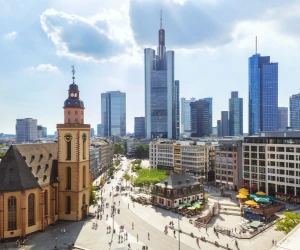
Communication Styles and Language
Effective communication is key to a smooth travel experience, and understanding the local language and communication styles can make a big difference.
- Language Barrier: While many Germans speak English, especially in cities, learning a few basic German phrases can go a long way in making your trip more enjoyable. Phrases like “Guten Tag” (Good day), “Bitte” (Please), and “Danke” (Thank you) are always appreciated.
- Directness: Germans are known for their direct communication style. They tend to be straightforward, which might come across as blunt or unfriendly to those from cultures where indirect communication is the norm. Tip: Don’t take it personally—what might seem abrupt is simply a cultural difference.
- Politeness: Despite their directness, Germans are generally polite and expect the same from others. Using “Bitte” (please) and “Danke” (thank you) in conversations is essential.
- Greeting Etiquette: A handshake is the standard form of greeting in Germany, even in casual settings. Address people using “Herr” (Mr.) or “Frau” (Mrs./Ms.) followed by their last name unless they invite you to use their first name.
Public Behavior and Expectations
German society values order, punctuality, and respect for public spaces. These cultural traits are evident in daily interactions and public behavior.
- Punctuality: Being on time is highly valued in Germany, whether you’re meeting someone for coffee or catching a train. Arriving late is considered rude, so plan to be on time—or even a bit early.
- Public Transport Etiquette: Germany has an efficient and reliable public transport system. When using buses, trams, or trains, remember to validate your ticket before boarding, offer your seat to those in need, and keep noise levels down, especially in designated quiet zones.
- Dining Etiquette: When dining out, it’s customary to say “Guten Appetit” before starting your meal. Tipping is common but not obligatory—rounding up the bill or leaving 5-10% is considered polite.
- Dress Code: Germans typically dress conservatively, especially in smaller towns. While casual attire is fine for most places, dressing smartly is appreciated in nicer restaurants and cultural venues like theaters and opera houses.
- Alcohol Consumption: Germany is known for its beer culture, and drinking in moderation is widely accepted. However, public drunkenness is frowned upon. Tip: If you choose to drink, do so responsibly and know your limits.
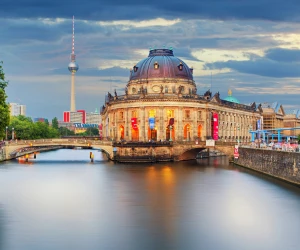
Safety Tips for Solo Female Travelers in Germany
While Germany is generally safe, taking certain precautions can help you avoid potential risks and ensure a smooth travel experience.
Staying Safe in Public Places
Public spaces in Germany are generally safe, but solo female travelers should still practice basic safety measures.
- Trust Your Instincts: If a situation or person makes you uncomfortable, don’t hesitate to remove yourself from the situation. Trusting your gut feelings is key to staying safe.
- Stay Alert: Be mindful of your surroundings, especially in crowded areas like markets, festivals, and public transport. Keep an eye on your belongings, as pickpocketing can occur in touristy areas.
- Avoiding Scams: While scams are not rampant, they do exist, particularly in major cities. Common scams include people asking for donations or trying to sell you something of little value. Politely decline and walk away.
- Night Safety: Germany’s cities are generally safe at night, but it’s wise to avoid poorly lit or isolated areas. Stick to well-populated streets and use well-known taxi services or rideshare apps like Uber if you’re out late.
Transportation Safety
Getting around Germany is easy thanks to its excellent public transportation system, but there are still a few safety considerations.
- Using Public Transport: Public transport is safe and widely used. Always validate your ticket and keep it handy in case of a ticket check. Avoid empty train carriages late at night and stay near the conductor’s area if you feel uneasy.
- Taxis and Rideshares: Taxis are reliable, and most drivers are honest and professional. It’s best to use official taxi ranks or call a taxi company directly rather than hailing one on the street. If using a rideshare service, verify the driver’s details before getting in.
- Driving in Germany: If you’re renting a car, be aware that Germany’s highways, known as Autobahns, have sections with no speed limits, which can be intimidating. Always stay in the right lane unless overtaking, and obey speed limits in urban areas.
- Cycling Safety: Cycling is popular in Germany, and most cities have dedicated bike lanes. Always wear a helmet, follow traffic rules, and use hand signals when turning. Tip: Renting a bike is a great way to explore cities like Berlin or Munich.
Accommodation Safety
Choosing safe and comfortable accommodation is crucial for a positive travel experience.
- Research Accommodations: Look for hotels, hostels, or Airbnb rentals with high ratings and good reviews, particularly from other solo female travelers. Websites like Booking.com and Hostelworld offer plenty of options.
- Safety Features: Ensure your accommodation has basic safety features like secure locks, a safe for valuables, and a 24-hour front desk or security service. Hostels should have lockers to store your belongings.
- Location Matters: Choose accommodations in safe, well-populated areas close to public transport, restaurants, and tourist attractions. Avoid areas known for nightlife if you’re sensitive to noise or want a quieter experience.
- Female-Friendly Accommodations: Consider staying in female-only hostels or rooms if you prefer extra privacy and safety. Some hotels and hostels even cater specifically to solo female travelers, offering additional security measures and female-only spaces.
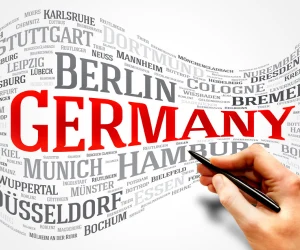
Legal and Emergency Information
Knowing the legal landscape and how to handle emergencies is essential for solo female travelers in Germany.
Local Laws and Customs
Germany’s laws and customs are generally straightforward, but there are a few things that solo female travelers should be aware of.
- ID Requirements: German law requires you to carry identification at all times. A photocopy of your passport is usually sufficient, but it’s advisable to carry the original if you’re staying in a hotel.
- Alcohol Laws: The legal drinking age is 16 for beer and wine and 18 for spirits. Drinking alcohol in public is generally allowed, but excessive public drunkenness is discouraged.
- Drug Laws: Germany has strict drug laws, and possession of illegal substances can lead to severe penalties. Stay clear of any drug-related activities.
- Public Transport Tickets: Always have a valid ticket when using public transport. Riding without a ticket can result in hefty fines and even legal trouble.
- Smoking Laws: Smoking is banned in most indoor public places, including restaurants, bars, and public transport. Look for designated smoking areas if you smoke.
Emergency Contacts and Procedures
In case of emergencies, knowing who to contact and how to respond can make a significant difference.
- Emergency Numbers: Dial 112 for police, fire, or medical emergencies. This number works across the EU and is free of charge. For non-emergencies, you can contact the local police by dialing 110.
- English-Speaking Services: In major cities, many emergency responders speak English, but it’s useful to know basic phrases in German, such as “Hilfe” (help) and “Notfall” (emergency).
- Consular Assistance: If you lose your passport or need legal assistance, contact your country’s embassy or consulate. Keep a copy of your passport and the contact details of your embassy with you at all times.
- Travel Insurance: Before traveling, ensure you have comprehensive travel insurance that covers medical emergencies, trip cancellations, and lost belongings. Keep your insurance details handy, and know how to contact your provider in an emergency.
- Local Support Networks: Many cities have expat groups or women’s support networks that can offer assistance or advice. Facebook groups or Meetups are great platforms to connect with other female travelers or locals who can offer support.
Navigating Social Situations as a Solo Female Traveler in Germany
Social interactions can be one of the most enriching aspects of travel, and Germany offers plenty of opportunities to connect with locals and other travelers.
Meeting Locals
Meeting locals can greatly enhance your travel experience, offering insights into German culture and everyday life.
- Language Exchanges: Participate in language exchange meetups, where you can practice your German while helping locals with English. These events are often informal and provide a relaxed setting to meet new people.
- Cultural Events: Germany has a vibrant cultural scene, with events ranging from beer festivals to classical music concerts. Attending these events is a great way to meet locals who share similar interests.
- Volunteer Opportunities: Volunteering is another excellent way to connect with locals and give back to the community. Organizations like Workaway offer opportunities to volunteer in exchange for accommodation, providing a deeper cultural experience.
- Social Apps: Use apps like Meetup or Couchsurfing to find social events or meet locals willing to show you around. These platforms often host events specifically for travelers, making it easy to meet people.
Making Friends with Other Travelers
Connecting with fellow travelers can provide companionship and valuable tips during your trip.
- Hostel Socials: Many hostels organize social events like pub crawls, game nights, or city tours, which are perfect for meeting other solo travelers.
- Tours and Day Trips: Joining group tours or day trips is an easy way to meet other travelers. Whether it’s a walking tour of Berlin or a day trip to Neuschwanstein Castle, you’ll find plenty of opportunities to bond with like-minded individuals.
- Traveler Communities: Online communities like Solo Female Travelers on Facebook offer a platform to connect with other women who are traveling alone. These groups are great for sharing tips, and advice, and even meeting up with fellow travelers.
- Travel Forums: Participating in travel forums on websites like Lonely Planet’s Thorn Tree or Reddit’s r/solotravel can help you connect with others heading to Germany at the same time as you.
Dealing with Unwanted Attention
While Germany is generally safe, solo female travelers should be prepared for the possibility of unwanted attention, particularly in busy tourist areas.
- Handling Harassment: If you experience harassment, it’s important to stay calm and assertive. In most cases, simply ignoring the individual or firmly saying “No” or “Stop” will suffice. If the situation escalates, move to a crowded area or seek help from local authorities.
- Confidence is Key: Projecting confidence can deter unwanted attention. Walk with purpose, maintain good posture, and avoid looking lost or unsure, especially in unfamiliar areas.
- Have an Exit Plan: When entering a new place, such as a bar or restaurant, identify potential exits and seating areas that are close to other patrons or staff. This ensures you can quickly leave if you feel uncomfortable.
- Avoiding Risky Situations: Trust your instincts and avoid situations that feel risky. If something doesn’t feel right, it’s better to leave or decline an invitation than to put yourself in a potentially unsafe situation.
Conclusion
Germany is a fantastic destination for solo female travelers, offering a mix of rich history, vibrant cities, and stunning landscapes. By understanding the cultural norms, taking basic safety precautions, and staying informed about local laws and customs, you can enjoy a rewarding and safe travel experience. Remember to trust your instincts, stay aware of your surroundings, and most importantly, have fun exploring everything Germany offers!
Germany’s well-developed infrastructure, friendly locals, and welcoming atmosphere make it an ideal destination for solo female travelers. Whether you’re wandering the streets of Berlin, hiking in the Bavarian Alps, or enjoying a quiet moment by a lake, you’ll find that Germany has something for every type of traveler. Embrace the adventure, meet new people, and create unforgettable memories on your solo journey through this fascinating country.
FAQs
1. Is it safe for females to travel alone in Germany?
Yes, Germany is generally considered safe for solo female travelers. The country has a low crime rate, and cities like Berlin, Munich, and Hamburg are well-equipped for tourists. However, as with any destination, it’s important to stay aware of your surroundings, especially at night, and follow basic safety precautions like avoiding poorly lit areas and keeping your belongings secure.
2. Is Germany safe for American tourists?
Absolutely, Germany is very safe for American tourists. The country is one of the most visited in Europe, and German cities are accustomed to international visitors. Public transportation is efficient, and most Germans speak English, making it easy for American tourists to navigate. Just be sure to follow local customs and stay informed about any travel advisories.
3. Is it safe to walk alone in Germany?
Yes, walking alone in Germany is generally safe, even in larger cities like Berlin and Munich. The streets are well-lit, and there is a strong police presence in most areas. However, as in any large city, it’s wise to stay in well-populated areas, especially after dark, and avoid walking alone in unfamiliar neighborhoods.
4. Is France or Germany safer?
Both France and Germany are relatively safe for travelers, but Germany often ranks slightly higher in safety indexes. Germany has a lower overall crime rate and is known for its efficient public services and well-maintained public spaces. That said, both countries have areas that are safer than others, so it’s important to research specific destinations within each country.
5. What is the safest city in Germany to visit?
Munich is often regarded as the safest city in Germany. It has a low crime rate, well-maintained public areas, and a strong police presence. Other cities like Heidelberg and Freiburg are also known for their safety, friendly locals, and welcoming atmosphere.
6. Can you survive in Germany with English?
Yes, you can easily get by in Germany with English. While German is the official language, English is widely spoken, especially in tourist areas, major cities, and among younger people. Most signs, menus, and public transport information are also available in English, making it convenient for non-German speakers.
7. Are Germans friendly to tourists?
Yes, Germans are generally friendly and welcoming to tourists. While they might not be as outwardly warm as some other cultures, they are helpful and polite. If you need assistance, most Germans are willing to help, and speaking a few basic phrases in German can go a long way in making a positive impression.

